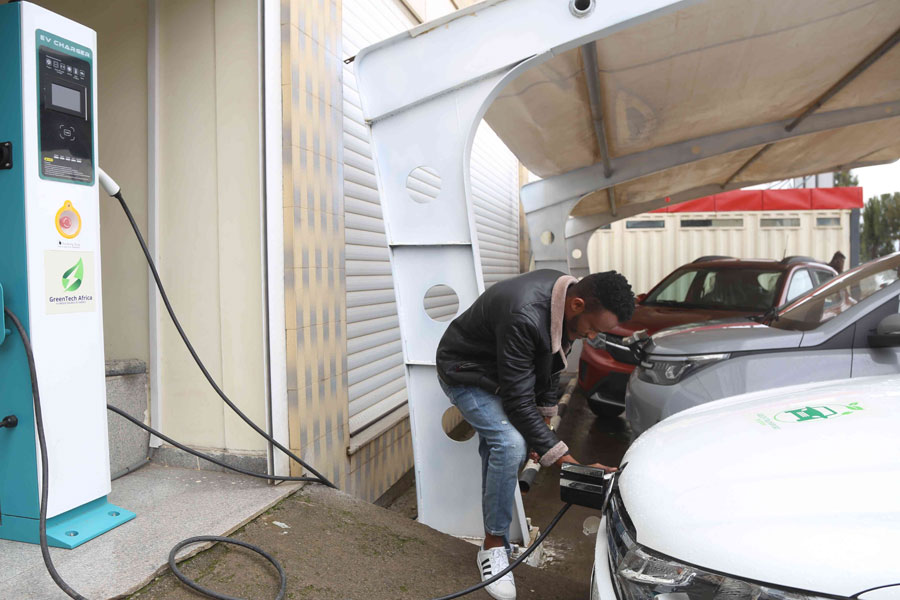
Feb 13 , 2024
By Mikael Alemu
Sitting in Khaldi's Coffee on Airport Road, onlookers can witness an emerging trend of streets scuttling with more electric vehicles (EVs) than one might have encountered in a European city a decade ago. The scene is a story of the rapid development of economies and societies, with Ethiopia embracing electric transportation at an impressive pace.
Countries around the world are increasingly adopting electric vehicles to address climate change and reduce pollution. Western nations, in particular, have set ambitious targets to phase out new internal combustion engine vehicle sales in the coming decades. Norway and the Netherlands, for instance, aim to ban new ICE car sales starting in 2025, while the United Kingdom (UK) plans to allow only electric car sales from 2030, later adjusting this target to 2035.
The European Union has its sights set on an "electric cars only" policy by 2035, and California has outlined targets for zero emissions vehicles (ZEVs) reaching 35pc by 2026 and 100pc by the year 2035.
These commitments reflect the countries' strong economic positions, with GDP per capita figures significantly higher. Norway boasts a GDP per capita (PPP) of 87,495 dollars, and California, if considered independently, would rank at around 80,870 dollars. They also benefit from stringent environmental protections and clean air policies. In contrast, Ethiopia's economic reality paints a different picture. With a GDP per capita (PPP) of 2,922 dollars in 2021, its income and consumption levels are less than five percent of those in the countries mentioned here.
The major sources of air pollution in our cities include wood burning for cooking and emissions from trucks and buses rather than passenger cars.
Given these disparities, Ethiopia's strategy for electric vehicle policy should initially focus on segments that are currently viable, such as urban rickshaws, while gradually building the infrastructure and incentives necessary for the wider adoption of electric passenger vehicles. This approach should align with projected economic growth and the expected increase in GDP per capita to nearly 5,000 dollars by the end of the decade.
Ethiopia's electricity generation capacity, currently at 5,000MW for a population of over 100 million, sharply contrasts with that of countries like the United States, which has 1.3 million megawatts, and the Netherlands, which has 475,000MW. This calls for realistic short-term priorities, with a focus on electrifying three-wheelers, or "bajajes," which are a popular form of urban transportation and contribute significantly to air pollution. The transition to electric bajajs, supported by a network of solar-powered charging stations, could serve as a cost-effective and environmentally friendly solution.
The initiative, coupled with the promotion of electric passenger cars in major cities like Addis Abeba, could be further facilitated through creative financing programs, tax incentives, and the development of public charging infrastructure.
Ethiopia could aim to launch an "Electric Transport Strategy" by 2035, with firm targets set for 2045, including the ban on new gasoline-powered auto rickshaws and small passenger cars in cities. Supporting policies would need to encompass tax credits, import duty exemptions, low-interest loans, and utility programs to make electric vehicles more accessible and affordable. Designating "EV zones" in city centres and ramping up renewable energy capacity are additional measures that would complement Ethiopia's adoption of electric transport.
By leapfrogging directly to electric vehicles, Ethiopia can position itself as a leader in sustainable transportation, driving innovation, enhancing energy independence, and contributing to a cleaner, healthier environment. In 25 years, the hope is that the same Kaldi’s Coffee on Bole Road will overlook a landscape where electric vehicles dominate the streets, marking a significant leap forward in Ethiopia's journey towards sustainable development and climate leadership.
PUBLISHED ON
Feb 13,2024 [ VOL
24 , NO
1241]


Commentaries | Jan 03,2021

My Opinion | Jul 27,2024

Viewpoints | Jul 30,2022

Viewpoints | Jan 05,2019

View From Arada | Jul 17,2022

Radar | Aug 08,2020

View From Arada | Aug 21,2021

Viewpoints | Jan 16,2021

Agenda | Jul 30,2022

Editorial | Nov 04,2023

My Opinion | 131558 Views | Aug 14,2021

My Opinion | 127912 Views | Aug 21,2021

My Opinion | 125887 Views | Sep 10,2021

My Opinion | 123518 Views | Aug 07,2021

Dec 22 , 2024 . By TIZITA SHEWAFERAW
Charged with transforming colossal state-owned enterprises into modern and competitiv...

Aug 18 , 2024 . By AKSAH ITALO
Although predictable Yonas Zerihun's job in the ride-hailing service is not immune to...

Jul 28 , 2024 . By TIZITA SHEWAFERAW
Unhabitual, perhaps too many, Samuel Gebreyohannes, 38, used to occasionally enjoy a couple of beers at breakfast. However, he recently swit...

Jul 13 , 2024 . By AKSAH ITALO
Investors who rely on tractors, trucks, and field vehicles for commuting, transporting commodities, and f...

Jun 28 , 2025
Meseret Damtie, the assertive auditor general, has never been shy about naming names...

Jun 21 , 2025
A well-worn adage says, “Budget is not destiny, but it is direction.” Examining t...

Jun 14 , 2025
Yet again, the Horn of Africa is bracing for trouble. A region already frayed by wars...

Jun 7 , 2025
Few promises shine brighter in Addis Abeba than the pledge of a roof for every family...

Jun 29 , 2025
Addis Abeba's first rains have coincided with a sweeping rise in private school tuition, prompting the city's education...

Jun 29 , 2025 . By BEZAWIT HULUAGER
Central Bank Governor Mamo Mihretu claimed a bold reconfiguration of monetary policy...

Jun 29 , 2025 . By BEZAWIT HULUAGER
The federal government is betting on a sweeping overhaul of the driver licensing regi...

Jun 29 , 2025 . By NAHOM AYELE
Gadaa Bank has listed 1.2 million shares on the Ethiopian Securities Exchange (ESX),...